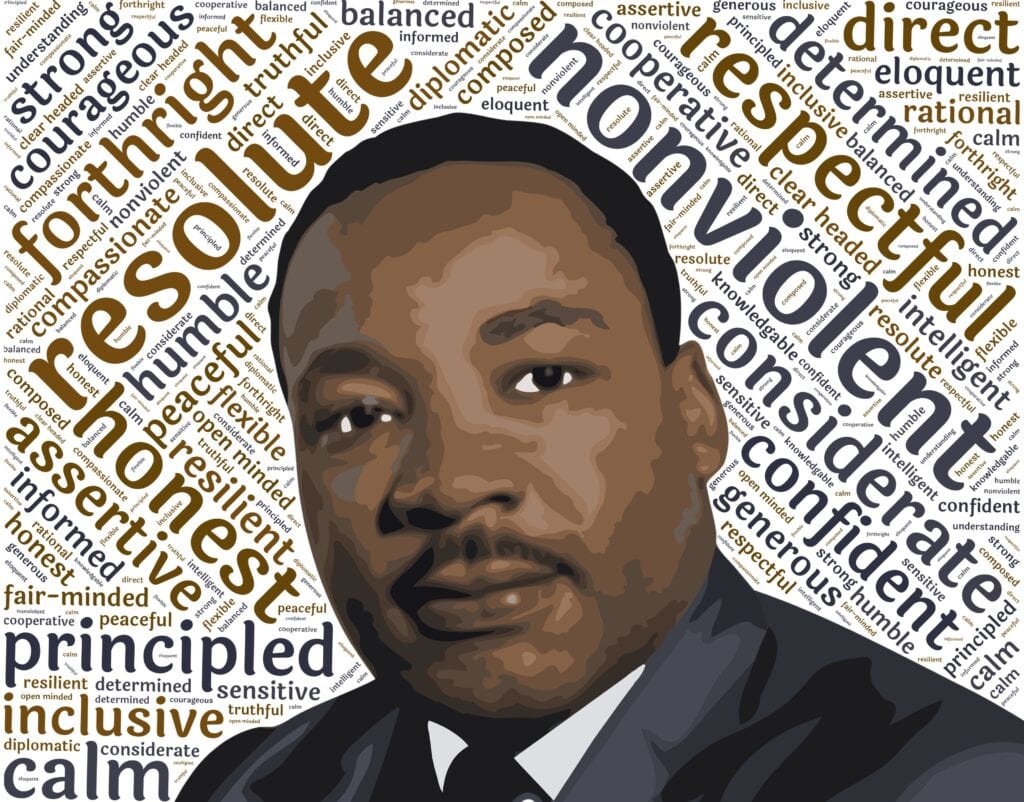No American in the twentieth century did more to bring about equality for the black community than Dr. Martin Luther King Jr.
Dr. King proclaimed that “love was more powerful than hate” and that peaceful protest was far more effective than violence in obtaining justice and equality.
King was an exceptional student and was admitted to Morehouse College at the age of 15, where he studied medicine and law.
After graduating in 1948, MLK Jr. entered Crozer Theological Seminary in Pennsylvania, earning a Bachelors of Divinity degree. He was awarded a distinguished fellowship and was elected president of his mostly white senior class.

King subsequently enrolled in a graduate program at Boston University. He completed his required classwork in 1953, earning a doctorate in Systematic Theology in 1955. While in Boston, he met Coretta Scott, a young singer from Alabama who was a student at the New England Conservatory of Music. He married Coretta Scott on June 18, 1953. The couple moved to Montgomery, Alabama, where King became Pastor of the Dexter Avenue Baptist Church.
Montgomery became the focal point for civil rights when the Supreme Court ruled in Brown Vs. Board of Education, in 1954.
On December 1, 1955, Rosa Parks, who was the secretary of the local chapter of the National Association for the Advancement of Colored People (NAACP), refused to give up her seat to a white passenger on a Montgomery bus, and was arrested in violation of Jim Crow laws. Activists coordinated a bus boycott that would continue for over a year. King was chosen to be the leader of the protest and be the group’s spokesperson.
Dr. King became the target of white supremacists, who bombed the King home in January 1956. Fortunately, no one was hurt.
In November 1956, The Supreme Court ruled that segregation on public buses was unconstitutional. King’s role in this victory for civil rights propelled him into the national spotlight.
King was inspired by the teachings of Mahatma Gandhi. King extensively read the works of Gandhi and learned more about the political activist and proponent of peaceful protests on a trip to India in 1959. King implemented the Gandhian principle of nonviolence in his own civil rights activism. He wrote: “While the Montgomery boycott was going on, India’s Gandhi was the guiding light of our technique of nonviolent social change.”
On September 20, 1958, King was signing copies of his book Stride Toward Freedom in Blumstein’s department store in Harlem when Izola Curry—a mentally ill black woman who thought that King, along with Communists, was conspiring against her—stabbed him in the chest with a letter opener, barely missing the aorta.
King survived, and the attempted assassination only strengthened his commitment to nonviolence. “The experience of these last few days has deepened my faith in the relevance of the spirit of nonviolence if necessary social change is peaceful to take place.”
In 1957, King and other civil rights activists, most of whom were fellow ministers, founded the Southern Christian Leadership Conference (SCLC), an organization dedicated to achieving full equality for African Americans through nonviolent protest. The motto of the SCLC was: “Not one hair of one head of one person should be harmed.”
King was a driving force in the Birmingham civil rights campaign of 1963, in which activists utilized boycotts, sit-ins, and marches to protest segregation, unfair hiring practices, and other injustices in the state’s capital city.
Arrested for his involvement on April 12th, King wrote the civil rights manifesto known as the “Letter from Birmingham Jail,” a persuasive justification for civil disobedience addressed to a group of white clergymen who had criticized his tactics.
Martin Luther King, Jr. in cooperation with a number of civil rights and religious groups organized the March on Washington for Jobs and Freedom, a peaceful political demonstration designed to highlight the injustices blacks continued to face across the country.
Held on August 28.1963, and attended by some 200,000 to 300,000 participants, the event is widely regarded as one of the most important moments in the history of the American civil rights movement and was instrumental in the passage of the Civil Rights Act of 1964.
At the end of the rally, Standing on the steps of the Lincoln Memorial, King delivered a soul-stirring speech, which became known as “I Have a Dream”. In the speech’s most celebrated passage, in which he departed from his prepared text, likely at the behest of Mahalia Jackson, who reportedly shouted, “Tell them about the dream!”
Here is an excerpt from King’s eloquent speech:
“I say to you today, my friends, so even though we face the difficulties of today and tomorrow, I still have a dream. It is a dream deeply rooted in the American dream.
I have a dream that one day this nation will rise up and live out the true meaning of its creed: ‘We hold these truths to be self-evident: that all men are created equal.”
Later that year TIME magazine named King “Man of the Year” and in 1964 Dr. King became the youngest person in history to receive the Nobel Peace Prize.
King continued to speak out and protest the violence and injustice blacks suffered in America. In the spring of 1965 King led the march from Selma to Montgomery Alabama to protest black voter suppression. White segregationists attacked the marchers. President Lyndon Johnson called in the national guard to keep the peace.
King was also a vocal opponent of the Vietnam war. King opposed the Vietnam War because it took money and resources that could have been spent on social welfare at home. “A nation that continues year after year to spend more money on military defense than on programs of social uplift is approaching spiritual death,” King said.
On the evening of April 4, 1968, In Memphis Tennessee, Martin Luther King was shot while standing on the balcony of a motel. King had traveled to Memphis to support a sanitation workers’ strike. King’s death sparked riots throughout the country. President Johnson declared a national day of mourning.
Dr. King’s legacy has left us a blueprint for ending inequality and racial injustice using peaceful means.
“I believe that unarmed truth and unconditional love will have the final word in reality. This is why right, temporarily defeated, is stronger than evil triumphant.” – Dr. Martin Luther King Jr.









